Mohammed Ben Sulayem’s rocky first year as FIA president
Since becoming FIA president, Mohammed Ben Sulayem has caused controversy at every turn. Andrew Benson looks back over a troubled leadership and asks what his change of role means for 2023
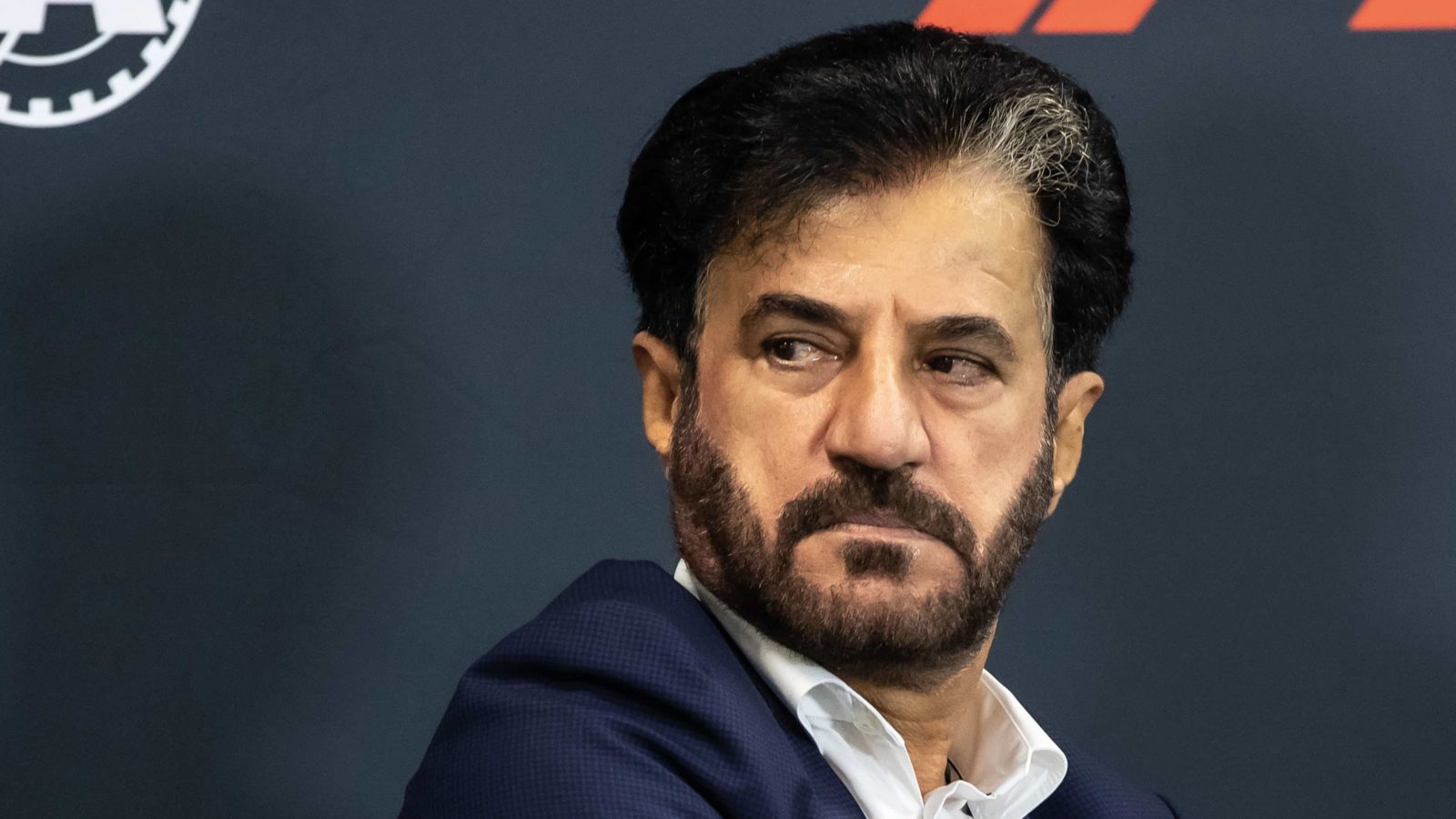
Getty Images
Formula 1 is used to conflict – between drivers, between teams, between the teams and the governing body. One might almost say the sport thrives on it. But not for more than 30 years has there been open warfare between the FIA and the company that makes F1’s money. Until now, that is.
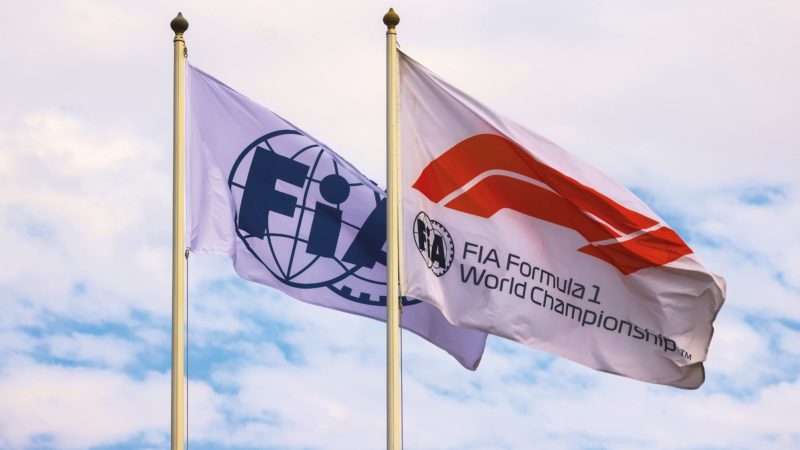
A war of words broke out between F1 CEO Stefano Domenicali
Getty Images
The way Mohammed Ben Sulayem has conducted himself as FIA president has been causing disquiet since he took the position in the immediate aftermath of the controversial climax to the 2021 world championship.
His second year in office is still young. But over a few short weeks in the new year, disquiet turned to something more severe, to the extent that some in F1 were beginning to wonder whether having Ben Sulayem heading the governing body was a sustainable proposition.
The path to this point had been strewn with controversies, most of them kept relatively low-key. But in January Ben Sulayem made a move that so angered commercial rights holders Liberty Media and its F1 company that their chief legal officers sent an explosive letter to the FIA Executive and World Motor Sport Council to complain.
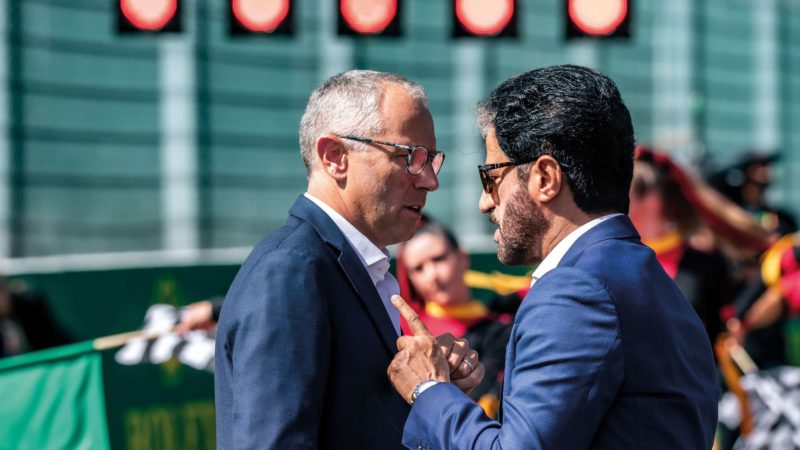
FIA president Mohammed Ben Sulayem
Alamy
Ben Sulayem had “interfered with our rights in an unacceptable manner”. He had “overstepped the bounds of both the FIA’s remit and its contractual rights”. The FIA “may be liable” for any damage to Liberty’s share value, it concluded. It was an extraordinary intervention in the relationship between two parties that are supposed to work together in the stewardship of motor sport’s top category, and it left many wondering what comes next.
The issue that so incensed F1 was a series of tweets Ben Sulayem posted in response to a news report claiming that Saudi Arabia’s Public Investment Fund had tried to buy F1 for $20bn (£16.6bn). Ben Sulayem referred to this as an “inflated price tag”, adding that “any potential buyer is advised to apply common sense, consider the greater good of the sport and come with a clear, sustainable plan – not just a lot of money”.
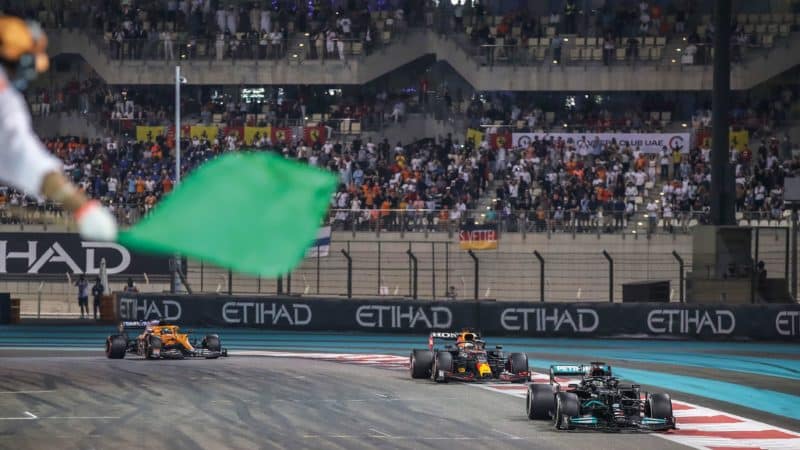
Ben Sulayem’s first task was the fallout from the 2021 Abu Dhabi GP.
Alamy
His intervention raised many eyebrows in F1. What was he trying to achieve, people wondered? Why had he seen fit to speak publicly on a commercial matter, which is F1’s domain both traditionally and contractually? Also, why did he not trouble to ask F1 whether the story was accurate? Sources, incidentally, say it was not. The Saudis are a major sponsor of F1 and host a race. They are interested in the idea of potentially buying F1. But there is said to have been no official Saudi bid and in any case Liberty has absolutely no intention of selling for the foreseeable future. The sport, as F1 chairman Stefano Domenicali put it, is Liberty’s “jewel”.
Ben Sulayem has not explained his motivation and an FIA spokesperson has said only that he had merely wished to express his personal opinion.
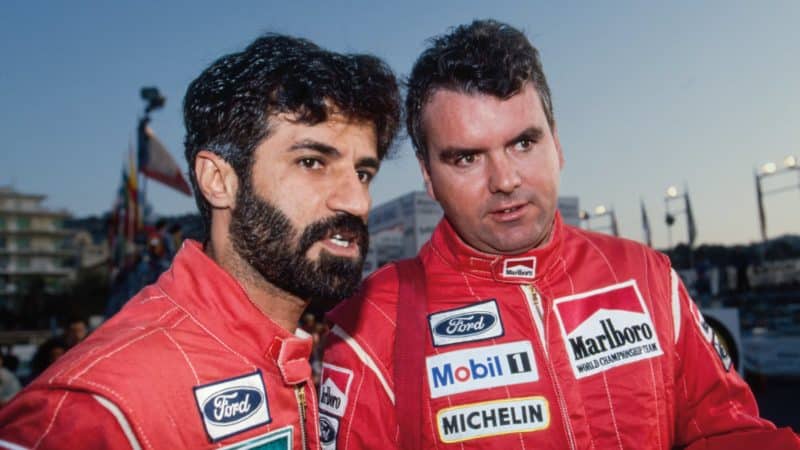
Rally driver Ben Sulayem, left, with co-driver Ronan Morgan, 1992
What is clear, however, is that many in F1 see the remarks as part of a pattern of behaviour that is making many senior figures in the sport uncomfortable and nervous.
Further alarm bells rang when an archived website emerged a few days later containing historic misogynistic remarks in which Ben Sulayem said he did not “like women who think they are smarter than men, for they are not in truth”. The FIA said the remarks “do not reflect the president’s beliefs”.
After 12 years of the consensual approach taken by his predecessor Jean Todt, Ben Sulayem took over at a time when the governing body was facing its biggest crisis for decades.
He was elected four days after the 2021 Abu Dhabi Grand Prix, in which race director Michael Masi’s actions were contrary to the sporting regulations, directly leading to the world championship changing hands from Lewis Hamilton to Max Verstappen.
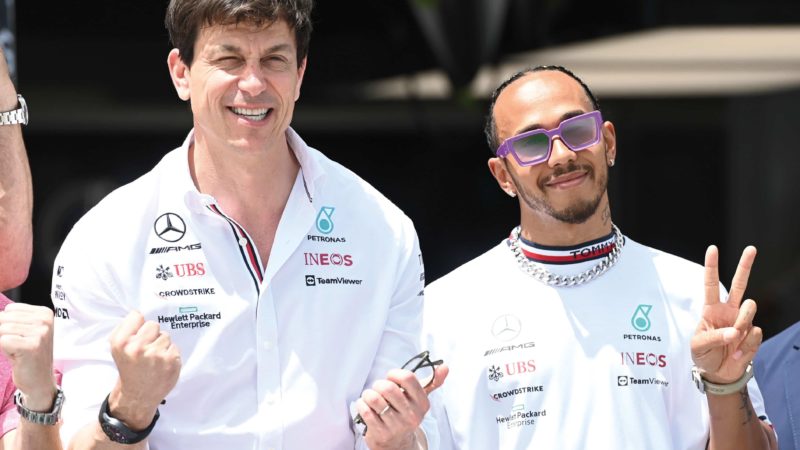
Toto Wolff and Lewis Hamilton were absent from the FIA Prize Giving
It’s known that Ben Sulayem resented the fact that his first job was to clean up someone else’s mess. Yet at his very first news conference, he created his first controversy.
Hamilton and Mercedes team principal Toto Wolff refused to attend the FIA gala that night in protest, breaking rules that require the presence of the top three drivers in the championship and the constructors’ title winners. Inevitably, Ben Sulayem was asked whether Hamilton would be punished. He might have been expected to pour oil on troubled waters. Instead, he said: “We have to follow our rules. It doesn’t stop us from making a champion feel good about the sport. It’s easy to be nice to people. But definitely if there is any breach, there is no forgiveness in this.”

No direct action was taken over Hamilton missing the FIA gala
Getty Images
In the end, no action was taken against Hamilton. At least not directly. But this willingness to act as disrupter was to become a theme. Concerns began immediately with the handling of the fall-out from Abu Dhabi. Todt’s last act as president was to launch an inquiry, but it took two months before the FIA took any official action, removing Masi and announcing a restructure of race control, and a further month before the report was published.
That report talked of “human error” and said Masi had not operated the safety car according to the regulations. But many regarded its conclusions as insubstantial and failing to get to the heart of what had gone wrong.
The following month, the FIA chose to make an issue of drivers wearing jewellery and non-regulation underwear during races –something that was presented as being the wish of new race director Niels Wittich, but which everyone was told had come from Ben Sulayem. Was this a way to get back at Hamilton, people wondered?
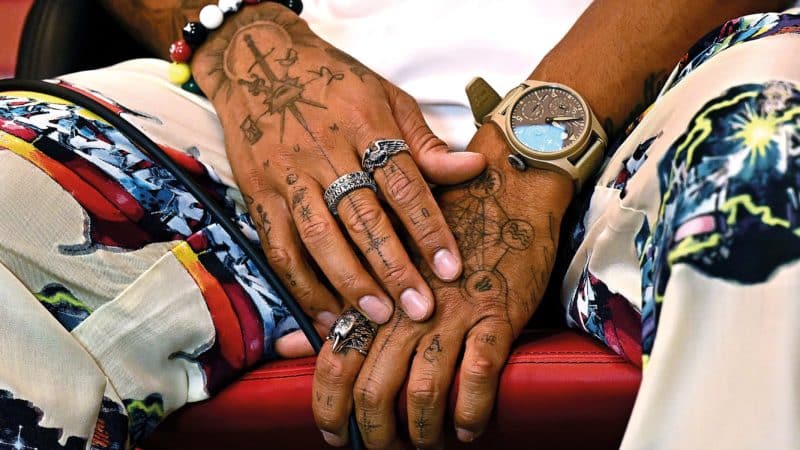
Hamilton was asked to remove jewellery and felt targeted.
Getty Images
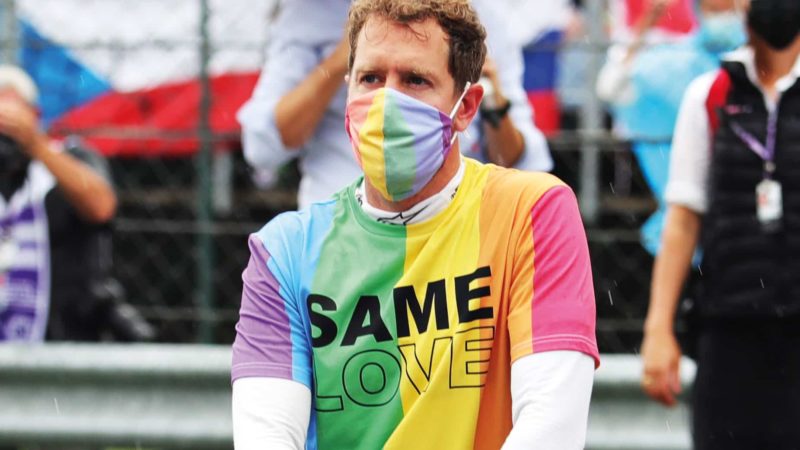
Sebastian Vettel’s multi-coloured political statement
In April, Ben Sulayem blocked a unanimous agreement between the teams and F1 to increase the number of sprint races in 2023 from three to six. Publicly, he said he wanted time to analyse its effect on workload at race control. Privately, he asked F1 for money for the FIA in return for his agreement, senior sources have said.
A month later, in his first interview as president, he seemed to indicate that he was not in favour of drivers speaking out on issues of the moment. “Niki Lauda and Alain Prost only cared about driving,” Ben Sulayem said. “Now, [Sebastian] Vettel drives a rainbow bicycle, Lewis is passionate about human rights and [Lando] Norris addresses mental health.
“Everybody has the right to think. To me, it is about deciding whether we should impose our beliefs in something over the sport all the time. I am from an Arabian culture. I am international and Muslim. I do not impose my beliefs on other people. No way! Never.”
The drivers were unimpressed, and Ben Sulayem later issued a clarifying tweet, saying he had “always believed in sport as a catalyst of progress in society” and that he “valued the commitment of all drivers for a better future”.

Another fine mess – Monaco
By now, the bosses at Liberty Media/F1 were getting worried. They were telling teams that they were looking at ways of effectively removing the FIA’s authority, perhaps reducing it to a figurehead role leaving F1 to run the sport.
And still the controversies kept coming. Ben Sulayem intervened on the issue of the new cars porpoising, much to the dismay of Red Bull, who felt he was doing so at the behest of Mercedes.
All year, there were rumblings of discontent about the operation of race control: from a refusal to put a barrier at a corner where two drivers crashed in Miami; through bungling the start process at Monaco; failing to get the Italian Grand Prix restarted after a safety car; and, worst of all, sending a recovery vehicle out on track in conditions of almost zero visibility at Suzuka – reviving memories of Jules Bianchi’s ultimately fatal crash there eight years before.
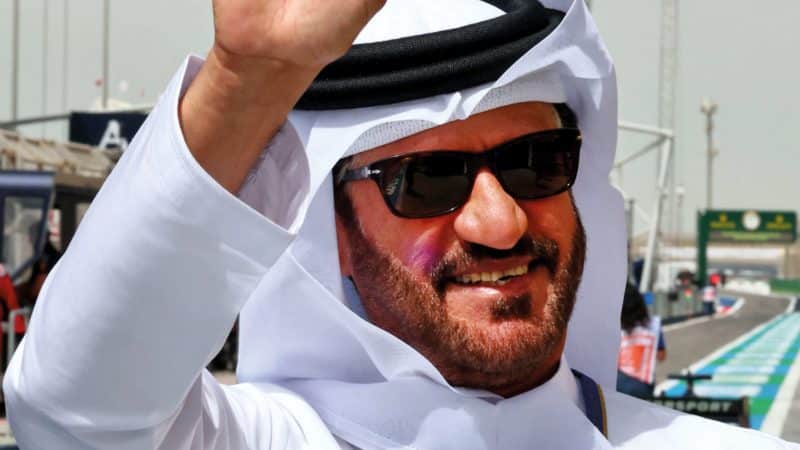
Ben Sulayem’s hands-on control of F1 has been relinquished
Alamy
The sprint-race controversy took six months to resolve, but not before Ben Sulayem had tried to get F1 to pay for a flash new motorhome for the FIA, to match that of the commercial rights holder. Ben Sulayem then published the 2023 calendar early, without telling Domenicali or the teams that he was doing so – even though it is F1 which draws up the calendar.
Then there was his haggling with Red Bull team principal Christian Horner over the punishment for breaching the cost cap in 2021 – not a great look, some said, for an organisation that claims to espouse transparency and good governance.
“Few are convinced that Ben Sulayem has vanished for good”
Over the winter, a clause was added into the sporting code that prohibits drivers from making “political, religious and personal statements or comments” without the written permission of the FIA. The edict caused such a stir that the FIA later issued a clarification. But the impression was that he was trying to muzzle them – and that his previous remarks about free speech had been no accident.
And finally – before the Saudi issue – there was a dispute over the US-based Andretti organisation’s potential entry into F1. Ben Sulayem has been publicly supportive; F1 noticeably lukewarm, reflecting almost unanimous objections from the teams.
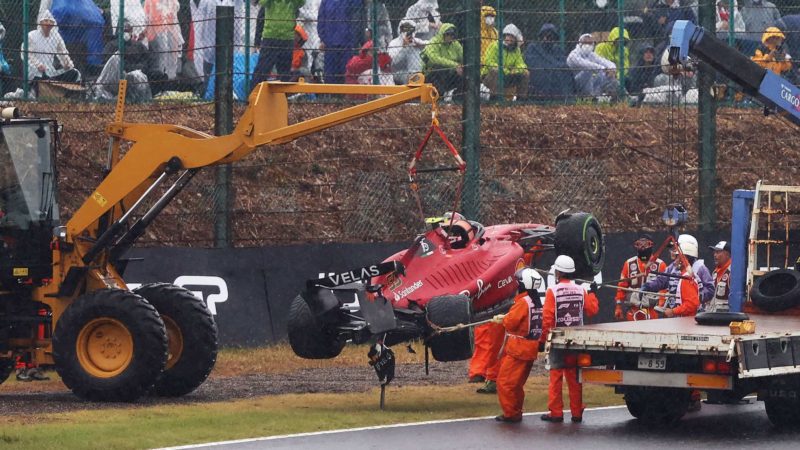
Deployment of a recovery vehicle in poor visibility during the 2022 Japanese Grand Prix was criticised
Getty Images
“There’s a general tension between the FIA and F1 over who’s running the show, and Mohammed would like to have more control than F1 would like or think is appropriate,” a team boss said, on condition of anonymity. “It goes back to sprint races – F1 and the teams were all in support of six sprint races at an F1 Commission meeting and then Mohammed goes, ‘Whoah, whoah, whoah.’ “It’s not really up to the FIA to decide. That’s a commercial thing. Then he announced the schedule without telling Stefano. He is trying to put his foot down: ‘This is the space the FIA owns and I am going to run it as I see fit.’
“That’s just going on, and it’s getting worse. I don’t think this story is over.”
The controversies over sprint races and Andretti were “annoyances”, the team boss added. Those over the Saudi report and misogyny were another level. “They crossed the line and could definitely get the FIA into trouble.”
To students of F1 history, this all carries echoes of the early 1980s and the so-called FISA-FOCA war. Then, as now, the president of the governing body – in that case Jean-Marie Balestre – was seeking to consolidate his power and authority and behaving in a manner the rest of F1 saw as erratic and autocratic. There was a power struggle, and in the end it was resolved with a compromise – the so-called Concorde Agreement that enshrined the way the sport was run, the fundamentals of which remain in place today.
In 2023, Ben Sulayem finds himself cast in the Balestre role. One F1 team boss has described his behaviour as “unprofessional”, and said his use of his personal Twitter account to make policy statements was “a bit peculiar” and “just wrong”. Ben Sulayem’s agenda, it is said by one insider, is to “reposition the FIA and put it back where he thinks it should be in respect of F1”.
So, where does the power lie? Ben Sulayem has correctly pointed out that the FIA owns the F1 world championship and that the commercial rights are leased to F1, of which Liberty is the current owner. This a reference to the so-called 100-year deal struck between then FIA president Max Mosley and Bernie Ecclestone under which F1 paid the FIA just over $300m for the rights until 2110. Mosley inserted what he called a ‘Don King clause’, giving the FIA powers to block a potential sale to a buyer it considered undesirable.
But under an agreement struck with the European Union back in 2000, the FIA cannot operate in the commercial sphere. It has to leave that to F1. In return, F1 pays a fee to the FIA – currently in the region of $40m a year – for its role in administering the regulations.
Ben Sulayem’s tweets on the Saudi story implied that he felt the FIA had a say over any potential sale. “It is our duty to consider what the future impact [of any sale] will be,” he wrote.
The F1 letter contests that. “The circumstances in which the FIA would have any role in a change of control of the F1 group are very limited,” Woodward Hill and Wilm wrote. “Any suggestion or implication to the contrary, or that any potential purchaser of the F1 business is required to consult with the FIA, is wrong.”
The reality is that the Don King clause no longer applies. It was written before F1 was a public company. Now, it is floated on the New York stock exchange. By definition, the shares can be traded with no input from the FIA. Liberty could sell to anyone it wanted to. If it wanted to.

Steve Nielsen has left his role as F1’s sporting director to oversee race control at the FIA
Grand Prix Photo
Meanwhile, F1 and Ben Sulayem may be at odds, but there is world championship to run this year and collaboration does continue. Ben Sulayem’s FIA lieutenants are rubbing along pretty well with F1. One of the most important developments over the winter has been the move of Steve Nielsen from F1 to become sporting director of the FIA, to oversee race control.
Nielsen, who had twice before turned down a similar role, was offered to the FIA by F1 because he was seen as the only candidate who could properly get a hold of the problems in race management. Vastly experienced and widely respected, his recruitment was universally welcomed as a sign that, on that at least, the FIA was moving in the right direction.
In the end, Ben Sulayem did take action to try to calm things down. He wrote to the team principals saying he would now “focus on strategic matters” and that their “day-to-day contact for all matters on F1” would be Nikolas Tombazis, who had been promoted to a new role as single-seater director in the reshuffle that included Nielsen’s recruitment.
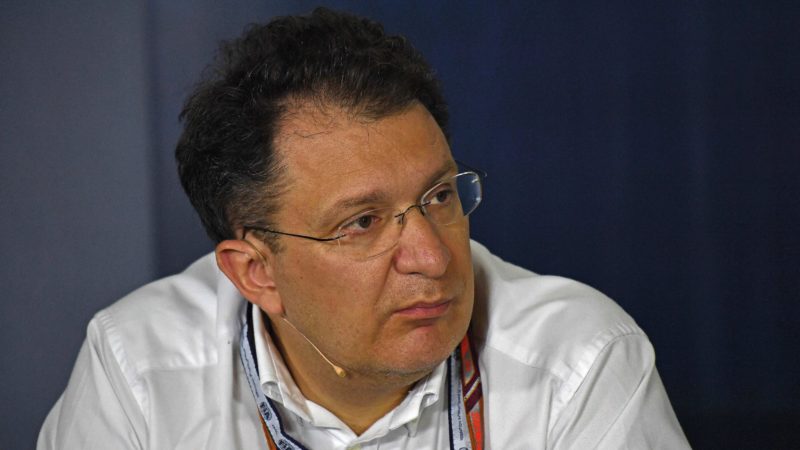
Nikolas Tambazis will look after handling of F1 ‘day-to-day’ operations
Grand Prix Photo
The teams have responded with cautious positivity to this development. “It got a bit exciting over the winter,” McLaren Racing chief executive officer Zak Brown said, “but things seem to have course-corrected.”
Few, though, are convinced that Ben Sulayem has vanished into the background for good. “The stars started lighting up in his eyes on F1,” one insider has said of his apparent desire to be high profile at grands prix.
The belief is that he had been advised that his position was at risk after so many controversies, and that he should lie low for a while. Give it a few months, people have said, and let’s see whether that is still the case.
Meanwhile, a comment from Wolff at last year’s Italian GP probably best sums up how F1 and the teams feel about the way the FIA should be run. “The most important thing is to have solid governance,” Wolff said. “There are rules written down, a governance framework that exists, and I think he stands for that. It is not always comfortable but most important is transparency and integrity and follow the rules. Nothing else.”
Andrew Benson is BBC Sport’s chief F1 writer
